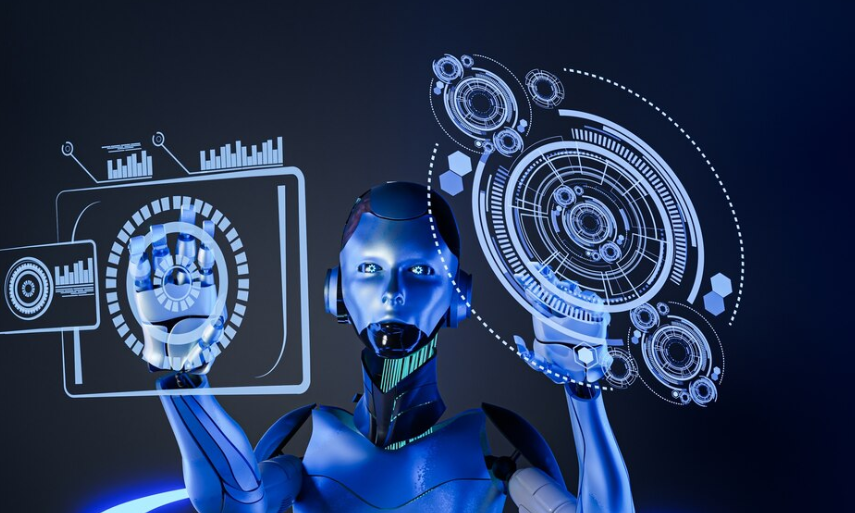A Inteligência Artificial (IA) está transformando a saúde, aprimorando os diagnósticos, simplificando as operações e melhorando o atendimento ao paciente.
Desde a detecção precoce de doenças até cirurgias robóticas, as soluções baseadas em IA estão tornando os cuidados de saúde mais eficientes e acessíveis.
No entanto, desafios como a privacidade dos dados, preconceitos e preocupações éticas devem ser abordados. Este conteúdo explora as inovações da IA na área da saúde e os obstáculos que surgem com a sua adoção.
Como a IA está revolucionando a saúde
IA usada aprendizado de máquina (ML), aprendizado profundo, processamento de linguagem natural (PNL) e visão computacional para analisar grandes quantidades de dados médicos, auxiliando médicos e pesquisadores na tomada de decisões mais rápidas e precisas.
IA em diagnóstico e detecção precoce de doenças
Algoritmos alimentados por IA podem analisar imagens médicas, como Raios-X, ressonâncias magnéticas e tomografias computadorizadas, com maior precisão e velocidade do que os radiologistas humanos. Os exemplos incluem:
- DeepMind do Google detecção de doenças oculares a partir de exames de retina
- Previsão de modelos de IA câncer, Alzheimer e doenças cardíacas com base em dados do paciente
- Dispositivos de IA vestíveis monitorar sinais vitais para alertas precoces de saúde
Descoberta e desenvolvimento de medicamentos alimentados por IA
A descoberta de medicamentos tradicionais leva anos e bilhões de dólares. A IA acelera esse processo ao:
- Análise de compostos químicos para identificar potenciais candidatos a medicamentos
- Previsão de interações medicamentosas e efeitos colaterais
- Ajudando a desenvolver medicina personalizada com base em dados genéticos
Assistentes Virtuais de Saúde e Chatbots
Chatbots e assistentes virtuais baseados em IA fornecem Suporte ao paciente 24 horas por dia, 7 dias por semana, verificação de sintomas e aconselhamento de saúde mental. Plataformas como Saúde Babilônia e Saúde Ada use IA para oferecer aconselhamento médico e agendar consultas.
IA em Cirurgias Robóticas
Cirurgia assistida por robótica, alimentada por IA, melhora precisão, flexibilidade e controle durante procedimentos complexos. O Sistema Cirúrgico da Vinci é um exemplo importante, permitindo cirurgias minimamente invasivas com tempos de recuperação reduzidos.
Planos de Tratamento Personalizados
A IA analisa o histórico do paciente, a composição genética e os fatores de estilo de vida para criar planos de tratamento personalizados para condições como câncer, diabetes e doenças crônicas. Esse medicina de precisão abordagem aumenta a eficácia do tratamento e minimiza os efeitos colaterais.
IA na Gestão Hospitalar
Os hospitais estão usando IA para:
- Otimize os horários da equipe e a alocação de recursos;
- Prever taxas de admissão de pacientes para melhorar a resposta a emergências;
- Melhorar os registros eletrônicos de saúde (EHRs) automatizando a entrada e análise de dados.
Desafios e preocupações éticas nos cuidados de saúde orientados pela IA
Apesar das suas vantagens, a IA na saúde enfrenta vários desafios:
Privacidade de dados e riscos de segurança
A IA em saúde depende de grandes quantidades de dados de pacientes, levantando preocupações sobre violações de dados, hackers e acesso não autorizado. Cumprimento estrito de regulamentos como HIPAA (EUA) e GDPR (Europa) é crucial.
Viés em algoritmos de IA
Os modelos de IA podem refletir preconceitos presentes nos dados de treinamento, levando a diagnósticos imprecisos ou injustos, especialmente para grupos sub-representados. Diversos conjuntos de dados e estratégias de mitigação de preconceito são necessários.
Falta de transparência (problema da caixa preta)
Muitos modelos de IA funcionam como “caixas pretas”, ou seja, profissionais de saúde não entendo completamente como a IA toma decisões. Esta falta de transparência pode afetar a confiança e dificultar a adoção clínica.
Questões Éticas e Legais
Quem é responsável quando a IA faz um diagnóstico errado ou recomendação de tratamento? São necessários quadros jurídicos claros para definir a responsabilidade nos cuidados de saúde baseados na IA.
Integração com Sistemas de Saúde Existentes
Muitos hospitais e clínicas falta a infraestrutura para integrar a IA sem problemas em seus fluxos de trabalho. A atualização de sistemas e a formação de profissionais de saúde são essenciais para a adoção generalizada da IA.
O futuro da IA na saúde
O futuro da inteligência artificial (IA) na saúde promete transformar profundamente a forma como prevenimos, diagnosticamos, tratamos e gerenciamos doenças. Com avanços tecnológicos acelerados e investimentos crescentes, a IA está se consolidando como uma aliada estratégica para profissionais de saúde e pacientes.
A seguir, exploramos as principais tendências que moldarão o cenário da saúde nos próximos anos.
Diagnósticos Mais Precisos e Antecipados
A IA está revolucionando a capacidade de detectar doenças em estágios iniciais. Algoritmos avançados analisam grandes volumes de dados, identificando padrões sutis que podem passar despercebidos por métodos tradicionais. Isso é particularmente relevante em áreas como oncologia, cardiologia e neurologia, onde a detecção precoce é crucial para o sucesso do tratamento.
Medicina Personalizada e Terapias Sob Medida
A análise de dados genômicos e históricos médicos permite que a IA desenvolva tratamentos personalizados para cada paciente. Essa abordagem, conhecida como medicina de precisão, considera as características individuais para maximizar a eficácia terapêutica e minimizar efeitos colaterais. Farmácias magistrais, por exemplo, podem utilizar IA para formular medicamentos específicos conforme o perfil genético do paciente.
Assistência Virtual e Monitoramento Remoto
Assistentes virtuais e chatbots baseados em IA estão aprimorando o atendimento ao paciente, oferecendo suporte 24 horas por dia. Além disso, dispositivos vestíveis e sensores conectados permitem o monitoramento contínuo de sinais vitais, possibilitando intervenções rápidas em caso de anomalias. Isso é especialmente benéfico para pacientes com doenças crônicas ou em reabilitação.
Robótica e Cirurgias Assistidas por IA
A integração de IA em sistemas robóticos está elevando o padrão das cirurgias, proporcionando maior precisão e reduzindo o tempo de recuperação. Robôs cirúrgicos assistidos por IA podem realizar procedimentos complexos com mínima invasividade, melhorando os resultados clínicos e a experiência do paciente.
Realidade Aumentada e Virtual na Educação e Tratamento
Tecnologias de realidade aumentada (RA) e realidade virtual (RV) estão sendo incorporadas na formação médica e na reabilitação de pacientes. Simulações imersivas permitem que profissionais de saúde pratiquem procedimentos em ambientes controlados, enquanto pacientes podem utilizar RV para terapias de exposição e controle da dor.
Blockchain para Segurança e Interoperabilidade de Dados
A segurança dos dados de saúde é uma preocupação crescente. O uso de blockchain oferece uma solução robusta, garantindo a integridade e a privacidade das informações médicas. Além disso, facilita a interoperabilidade entre diferentes sistemas de saúde, promovendo uma troca de informações mais eficiente e segura.
Saúde Mental e IA: Novas Fronteiras
A IA está sendo aplicada no suporte à saúde mental, com o desenvolvimento de aplicativos que oferecem intervenções terapêuticas e monitoramento emocional. Essas ferramentas podem identificar sinais precoces de transtornos mentais, permitindo intervenções oportunas e personalizadas.
Desafios Éticos e Regulatórios
Apesar dos avanços, o uso da IA na saúde levanta questões éticas e legais. É essencial garantir a transparência dos algoritmos, proteger a privacidade dos pacientes e evitar vieses nos sistemas de decisão. No Brasil, o Projeto de Lei 2338/2023 busca estabelecer um marco regulatório para o desenvolvimento e uso responsável da IA, assegurando a proteção dos direitos fundamentais e promovendo a inovação segura.
Conclusão
A IA está remodelando os cuidados de saúde, tornando os diagnósticos mais rápidos, os tratamentos mais personalizados e as operações hospitalares mais eficientes. No entanto, para concretizar plenamente o seu potencial, desafios como a segurança dos dados, preconceitos e preocupações éticas devem ser cuidadosamente abordados.
Com investigação contínua e desenvolvimento responsável da IA, o futuro dos cuidados de saúde será mais inteligente, mais preciso e mais acessível para todos.


